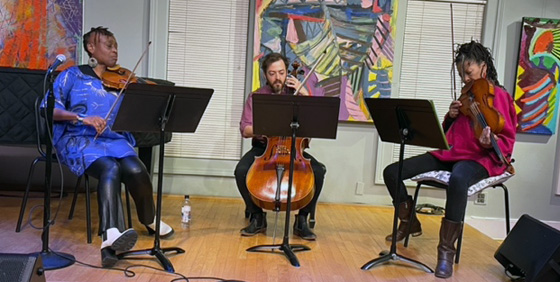
Gwen Laster and The Cookers Heat Up a Winter’s Night
Ann Arbor was full of events on the cold Saturday night of December 4, but even though the Wolverines were playing an out-of-town night game against Purdue, people came out to hear music, and what a choice there was. Kerrytown Concert House was presenting Gwen Laster’s New Muse Trio, with leader on violin, violist Melanie Dyer, and cellist Jake Charkey, playing music from a new CD entitled Blue Lotus. Laster’s work is all encompassing, a 21st-century amalgam of jazz, classical, and folk melodies that comes together in passionate compositions inspired by a deep concern for social and racial injustice, as exemplified by her composition “Cigarette,” motivated by the tragedy of the death of 23-year-old Sandra Bland in police custody. The breadth of the trio was further exemplified by a piece referencing Hindustani music written by cellist Charkey, a product of his long apprenticeship in India. The sublime interaction between the performers and potent soloing, combined with a well-planned program made for a wonderful unforgettable evening of emotionally powerful music.
From the Concert House it is but a short walk to the Blue LLama, where it was possible to catch the second set of a two-day residency by The Cookers, an all-star dream band that needs no introducing: Billy Harper (below) on tenor sax, Eddie Henderson and David Weis on trumpet, Donald Harrison on alto sax, pianist Xavier Davis in for Ge orge Cables, Cecil McBee on bass, and Billy Hart on drums. These gentlemen are hardly in the first blush of youth, but if you closed your eyes, you would never know it. Hart was thunderous, aided by 86-year-old McBee, and all members of the front line provided emotionally charged, technically virtuosic solos. Davis, although just subbing, provided perfect accompaniment and impressive solos on all tunes and one wants to hear more from him, as he teaches at Michigan State University just down the road. It would be hard to single out any particular solo in such an evenly matched group, but the one standout to me was the one ballad of the set, Harper’s “If One Could Only See,” a feature for Henderson’s warm-toned trumpet. Here, as in his other outings, he told stories, with subtle inflections, not a superfluous note, no running of patterns, just heartfelt creativity. Truly one of the greats of this kind of music. The evening ended appropriately with a feature for Hart, who gave his all showing us all how to play the drums in an exciting and yet subtly musical manner!
orge Cables, Cecil McBee on bass, and Billy Hart on drums. These gentlemen are hardly in the first blush of youth, but if you closed your eyes, you would never know it. Hart was thunderous, aided by 86-year-old McBee, and all members of the front line provided emotionally charged, technically virtuosic solos. Davis, although just subbing, provided perfect accompaniment and impressive solos on all tunes and one wants to hear more from him, as he teaches at Michigan State University just down the road. It would be hard to single out any particular solo in such an evenly matched group, but the one standout to me was the one ballad of the set, Harper’s “If One Could Only See,” a feature for Henderson’s warm-toned trumpet. Here, as in his other outings, he told stories, with subtle inflections, not a superfluous note, no running of patterns, just heartfelt creativity. Truly one of the greats of this kind of music. The evening ended appropriately with a feature for Hart, who gave his all showing us all how to play the drums in an exciting and yet subtly musical manner!
photographs by Piotr Michalowski